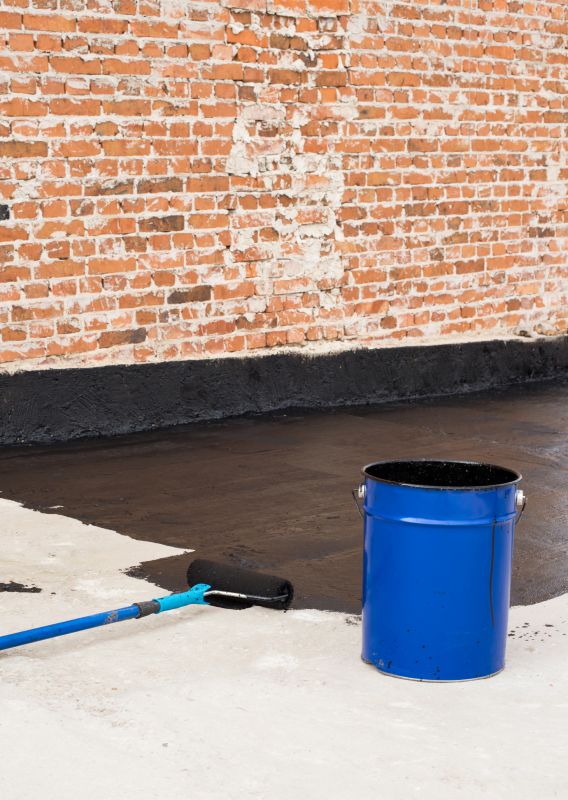Ultimate Guide to Foundation Sealing Solutions for Homeowners
Learn about the key features and benefits of top foundation sealings to choose the right product for your needs.
 Foundation sealing products are essential tools for maintaining the integrity and durability of a building's foundation. They serve to prevent water intrusion, reduce soil movement effects, and protect against moisture-related damage. Proper sealing can help prolong the lifespan of a foundation by preventing cracks and deterioration caused by water infiltration and shifting soil conditions.
Foundation sealing products are essential tools for maintaining the integrity and durability of a building's foundation. They serve to prevent water intrusion, reduce soil movement effects, and protect against moisture-related damage. Proper sealing can help prolong the lifespan of a foundation by preventing cracks and deterioration caused by water infiltration and shifting soil conditions.
Top Overall Option
Universal Foundation Sealant
A versatile, high-performance sealant designed to adhere to a variety of foundation materials. Its flexible formulation allows it to accommodate slight movements and temperature fluctuations, making it suitable for both new construction and repair projects. Easy to apply and durable over time, it provides a reliable barrier against water and moisture intrusion.
Types of Products For Foundation Sealings
Acrylic Sealants
Water-based sealants ideal for filling cracks and joints with good adhesion properties and easy clean-up.
Polyurethane Sealants
Durable, elastic sealants suitable for sealing larger gaps and joints with excellent adhesion to concrete and masonry.
Bituminous Coatings
Heavy-duty coatings that provide waterproofing and sealing for below-grade foundations and retaining walls.
Hydraulic Cement
Fast-setting cement used to fill and seal active leaks and cracks in foundations, especially for emergency repairs.
Rubberized Sealants
Flexible, weather-resistant sealants that adapt to foundation movement and temperature changes.
Liquid Rubber Coatings
Seamless, waterproof coatings ideal for sealing foundation surfaces and preventing moisture ingress.
Polyurea Coatings
Fast-curing, high-performance coatings that provide a durable seal against water and chemicals.
Sealant Tape
Flexible, adhesive tapes designed for quick sealing of cracks and joints on foundations.
Foam Sealants
Expanding foam products used to fill and seal larger gaps and penetrations in foundations.
Bitumen Sheets
Self-adhesive sheets used for waterproofing and sealing foundation surfaces from moisture.
Epoxy Sealants
High-strength sealants for filling cracks and joints with excellent adhesion and chemical resistance.
Silicone Sealants
Flexible, weatherproof sealants suitable for sealing around foundation penetrations and joints.
Hydrophobic Densifiers
Chemical treatments that penetrate concrete to reduce water permeability and enhance sealing effectiveness.
Crack Injection Systems
Specialized kits for injecting sealants into active cracks to restore foundation integrity.
Popular Choices
Widely used for small cracks and joints due to their ease of application and good adhesion.
Chosen for their flexibility and durability in sealing larger gaps and joints.
Commonly used for emergency repairs and sealing active leaks in foundations.
Favored for their seamless waterproofing properties on foundation surfaces.
Popular for quick, effective sealing of cracks and penetrations with minimal tools.
Preferred for high-performance sealing in demanding environments due to quick curing and durability.
Commonly used for sealing around foundation penetrations and joints requiring flexibility.
Popular for restoring the integrity of cracked foundations with minimal invasive procedures.
Chosen for their waterproofing qualities in below-grade and retaining wall applications.
Used for filling cracks requiring high adhesion and chemical resistance.
Effective for filling large voids and gaps in foundation walls and around penetrations.
There are various types of foundation sealants available, each suited for different applications and conditions. Some sealants are designed for use in concrete joints, while others are formulated for filling cracks or sealing around piping and utility penetrations. The choice of product often depends on the size of the opening, the type of foundation material, and the environmental exposure.
Applying the right sealing product requires careful consideration of the specific needs of the project. Factors such as temperature tolerances, adhesion properties, flexibility, and curing time influence the effectiveness of a sealant. Proper surface preparation, including cleaning and drying, is crucial to achieve optimal adhesion and long-lasting results.
Using high-quality foundation sealing products can help mitigate future repair costs and safeguard property value. Regular inspection and maintenance of foundation seals are recommended to ensure ongoing protection. Whether used during initial construction or for repairs, selecting the appropriate sealing solution is vital for maintaining a stable and secure foundation.
Key Buying Considerations
- Compatibility with foundation material such as concrete, brick, or masonry.
- Flexibility of the sealant to accommodate minor foundation movements.
- Water resistance and waterproofing capabilities of the product.
- Ease of application, including tools required and curing time.
- Durability and long-term performance of the sealant under environmental exposure.
- Adhesion strength to prevent peeling or detachment over time.
- Temperature tolerances to ensure performance in local climate conditions.
- Curing time and whether it allows for quick sealing or requires extended drying.
- Compatibility with other repair products or coatings being used concurrently.
- Cost-effectiveness considering the coverage area and longevity.
- Resistance to mold, mildew, and other biological factors.
- Ability to seal cracks of various widths and depths.
- Environmental conditions during application, such as humidity and temperature.
- Availability of professional or DIY application options.
- Brand reputation and product reviews for reliability and performance.
This content contains affiliate links and we may earn a commission at no additional cost to you.
